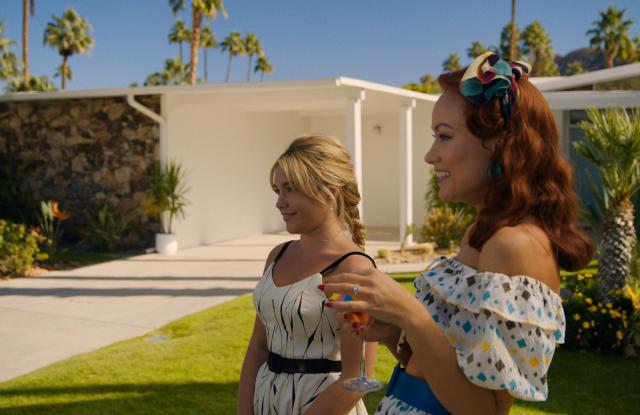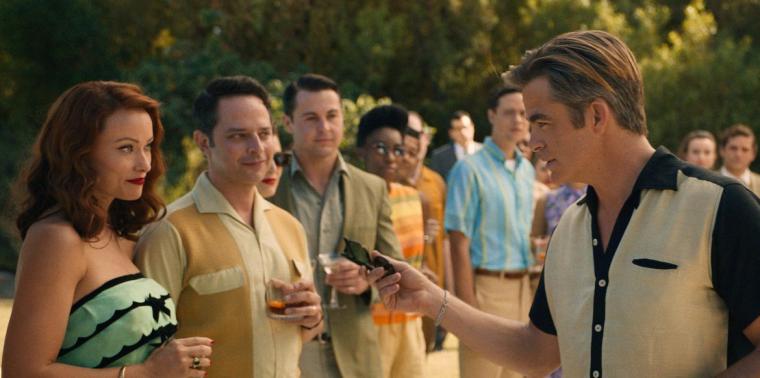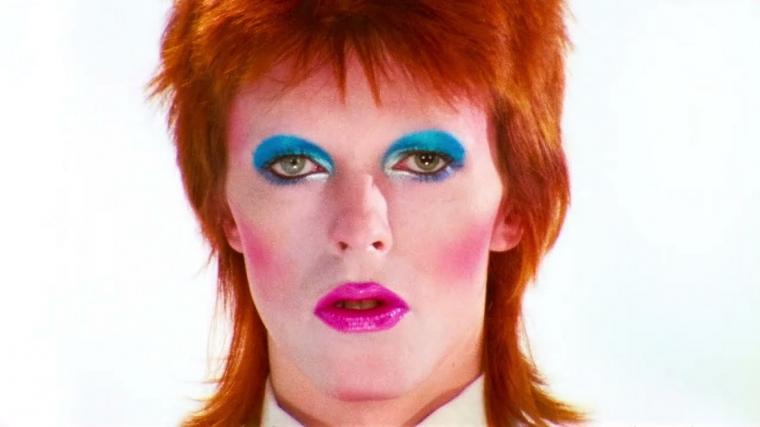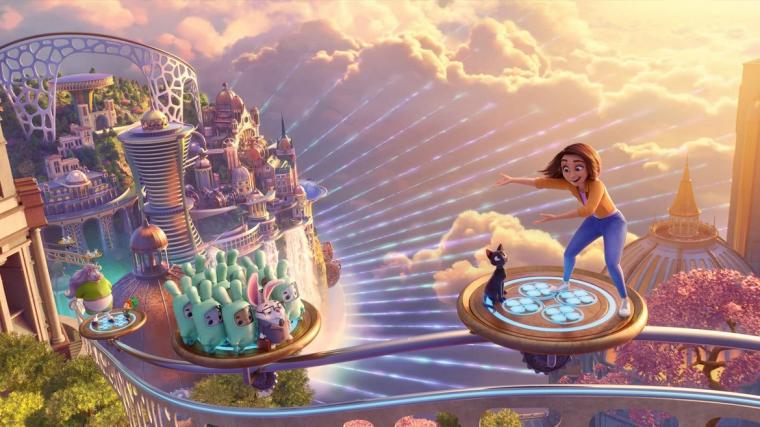
Florence Pugh and Harry Styles in Don't Worry Darling
DON'T WORRY DARLING
In the days and weeks preceding the movie's nationwide debut, the burning question regarding Don't Worry Darling wasn't whether the psychological thriller would be good, or even simply fun. It was whether the film could possibly be as much fun as the social-media hysteria surrounding its release. On-set screaming matches between director Olivia Wilde and star Florence Pugh! The firing or quitting of original leading man Shia LaBeouf! Wilde leaving longtime romantic partner (and father of her two kids) Jason Sudeikis for new leading man Harry Styles! Celebrities refusing to stand next to one another on the red carpet! Styles reportedly spitting on co-star Chris Pine! So many schadenfreude-rific truths/rumors to unpack!
Well, the short answer to the “Is it as enjoyable as the accompanying drama?” question is no, it's not. In truth, now that Don't Worry Darling can actually be seen, we're faced with perhaps the most disappointing outcome imaginable: Wilde's movie is neither entertaining enough to transcend the pre-release snark, nor embarrassing enough to make that snark feel juicily prescient. It isn't great and it isn't awful; it just kind of is. Katie Silberman's screenplay boasts some solid ideas, the images have a memorably crisp hyper-clarity, and several supporting performances, particularly Pine's, are first-rate. Yet the film is frustrating because we always seem to be one step ahead of our protagonist, who takes an eternally long time to figure out things that most viewers will glean from the start. And until the Big Twist (which isn't that big a twist) lands toward the end, there's so much repetition in the narrative, with so many stylistic gambits replayed over and over, that I, for one, left amazed that Wilde and Silberman needed more than two hours to tell such a puny story. Some movies are love-them-or-hate-them. The polished, mediocre Don't Worry Darling doesn't do much to inspire either reaction.
Wilde's followup to 2019's vastly superior Booksmart opens with an exuberant, drunken cocktail party among suburban friends, including its hostess Alice Chambers (Pugh), wife to up-and-coming business executive Jack (Styles). Although the conversation has a boisterous, modern vivacity, the décor and costuming suggest the late 1950s or early '60s, as does the first of what will feel like a Scorsese-marathon's worth of background pop tunes. I instantly recognized the first song as “Night Time Is the Right Time,” an R&B classic that's perhaps best remembered as the Ray Charles number the Huxtables lip-synched to (with little Rudy going to town on her “Bay-baaaay”s) in a famed episode of The Cosby Show. If the aural allusion was intentional, and I have no reason to think it wasn't, beginning a gaslighting thriller with inference to Bill Cosby is a spectacularly crafty and insidious move. Sadly, though, this is about as delectably nasty as the movie's wit ever gets.

The following morning, we watch as all of the neighborhood cul-de-sac's husbands, their gleaming cars as colorfully varied as Skittles, drive off to work, with all of their wives eerily posed on their front lawns, waving goodbye. Given the precise symmetry of the compositions and synchronicity of the motion and blandly cheerful grins of both breadwinners and stay-at-home spouses, we're clearly in Stepford territory here – or maybe Westworld, or Truman Burbank's Seahaven. But no one (beyond the audience) appears to think anything is amiss in this plaid town of Victory, California, where men all travel to the same company headquarters in the middle of the desert, women are forbidden to drive, and houses are dutifully cleaned, dinners cooked, and martinis prepped in time for the husbands' return. It isn't until Alice opens a carton of eggs and discovers their contents to be all shell and no yolk that she begins to suspect that something not-so-funny might be going on.
Despite the obviousness of its Twilight Zone-y setup, my problems with Don't Worry Darling really began with that scene, because if you opened a carton of eggs and found them all intact but with nothing inside, wouldn't you tell someone about it? Maybe your spouse or a friend or the grocer? Alice, however, ignores the issue. But even when the weirdness can no longer be ignored – when Alice notices the distraught behavior of her neighbor Margaret (KiKi Layne) and watches as a plane apparently crashes to the profound indifference of her trolley conductor – there's little follow-through on the strange happenings in Victory, and an abject tedium begins to set in.
Alice expresses her misgivings to girlfriends at the boutique and the pool; they blithely remind her that she has a perfect life. She witnesses a horrific suicide and is whisked away by men in red hazmat suits; Jack tells her she misinterpreted the event. (Bizarrely, in recalling the incident, Alice never mentions the hazmat guys to her husband, and we never learn where they took her or what they may have said.) She begins having disturbing hallucinations in dance class and while cleaning the house; the appointed Victory doctor merely prescribes a sedative. (At one point, Alice sinks into the tub while her mirrored reflection watches her submerge – a sight that Alice herself couldn't possibly see. Are we supposed to be hallucinating for her?) For close to 90 minutes, this is all that Don't Worry Darling gives us – Alice growing increasingly manic while those around her grow increasingly reassuring – and all we can do is wait for the moment in which we discover precisely what the deal is in the faux-chipper cartoon world of this Eisenhower-era landscape. When the truth is ultimately revealed, the explanation isn't bad – but it brings with it a whole new set of frustrating plot holes, and doesn't make up for the overall dullness of the journey.

Beyond the film's sensational production and costume design, there are a few elements that help alleviate the monotony, chief among them Chris Pine's Victory overlord Frank. Sleek and sinister, and with a chest-thumping oratorical manner that suggests the ickiest blend of Tony Robbins and Robert Bly, the actor is delightfully reptilian, with the movie's best sequence a deeply uncomfortable dinner party at which Alice finally confronts Frank and his tight-lipped smile implies “Bring it on.” Nick Kroll, Asif Ali, the slyly hilarious Kate Berlant, and Wilde herself are terrific as the Chambers' pals and neighbors, all of them just distinctive and human enough to make you nearly certain that Victory isn't populated solely by robots. And as a director, Wilde comes through with random blasts of true visual panache: a black-and-white Busby Berkeley chorus line that turns ugly and menacing; a hunched, grimy figure whose very posture is like the physical embodiment of a lost soul tumbling down a QAnon wormhole.
Still, there are just as many directorial missteps as there are instances of excellence – a late-film car chase is staged especially poorly – and unfortunately, Pugh and Styles are unable to rescue the clunkiness through charisma alone. Pugh is as game and forceful as ever, yet exhibits so much personality from the start that you don't buy Alice as a vacant entity whose consciousness has to be gradually raised; the performer gives her role a solid shot, but she's inherently miscast. Styles, meanwhile, has an appealing, friendly presence and is certainly watchable, but is probably still too green a film actor to give Jack the hidden reserves of feeling and threat he needs. (It would have been interesting to see what Shia LaBeouf – who would seem to be Styles' opposite in every conceivable way – might have done with the part.) A feature-length bummer peppered with occasional saving graces, Don't Worry Darling gave me no reason to want to watch it again, even with its Big Twist re-shaping our understanding of what came before. But a documentary, or even a fictionalized reenactment, on the making of Don't Worry Darling? By all means, sign me up.

MOONAGE DAYDREAM
David Bowie fanatics will likely find themselves in Heaven during the sensory overload of director Brett Morgen's Moonage Daydream. The rest of us, for the two hours and 15 minutes of Morgen's documentary, might find ourselves on a somewhat less lofty plane of existence.
Employing live concert sequences, MTV videos, samplings of artwork, clips of film and stage performances (plus a once-ubiquitous Pepsi commercial with Tina Turner), TV interviews, and loads of previously unreleased footage from the late icon's massive collection, this sprawling, wildly ambitious offering has to stand as the Bowiest Bowie movie of all time, and the good news is that even at its finale, I wasn't quite Bowied out. He was such an electrifying, chameleonic presence that you can be easily swept along for the ride on his music alone – though you might be surprised by some of the canonical numbers, such as “Young Americans,” that Moonage Daydream doesn't include. And in the interview segments dating back to the early '70s, the artist comes off as so thoughtful and articulate and humble and happy that, frankly, I longed for even more of them. While I was relieved that Morgen eschewed the traditional talking-heads format for his doc – there are no present-day reminiscences from friends, family, or fans – I already knew that Bowie, as a creative talent, was thunderously gifted. I didn't know that, as a talk-show guest, he was so disarmingly endearing.
Yet for a work that pretty much ignores the last 20 years of its subject's life and focuses instead on the 30-year high that preceded them, Morgen's cinematic ode still feels curiously empty – or maybe not empty so much as redundant. To be sure, the glories are bountiful and continual: Bowie in his Ziggy Stardust heyday, his vocals divine and his wardrobe awe-inspiring; Bowie relishing the adoring stadium shrieks of tens of thousands during the Let's Dance era. (This theatre lover was personally grateful to finally see clips of the star during his engagement as The Elephant Man on Broadway.) His voice-over accounts of his upbringing and personal philosophies, meanwhile, are devastating in their hushed, soulful delicacy. I entered my screening already admiring David Bowie and left loving him. It was the eventual sameness of Morgen's presentation that I didn't exactly love.

The filmmaker deserves props for his doc's playful chronological leapfrogging and inarguable immersive quality, with the exquisite sound mixing and trippy visuals making you feel like you're not just listening to but in Bowie's songs. Yet you become quickly aware of the repetition: a bit of Ziggy, a few steps forward, and a new cultural milestone; then back to a bit of Ziggy, a few more steps forward, and another cultural milestone; and on and on again through the mid-'90s. Dabbled throughout these scenes of awkward forward-and-backward momentum are devices that Morgen repeats past the point of interest: largely context-free images from crappy '50s sci-fi flicks and masterworks including Nosferatu and 2001; pastiches of Bowie working on his art canvases and toying with performance-art dance; shots, culled from a 1984 documentary, of the artist forever riding up and down escalators in Bangkok; clips of Bowie's own film roles – including, for a hot second, his turn in Labyrinth – but shown without identifying captions or anything in the way of relevance to either the time period or the mood. I didn't necessarily mind that Moonage Daydream was so coy in terms of biography. (Watching the film, you'd never know that Bowie was married, from 1970 to 1980, before wedding supermodel Iman in 1992.) But I was bothered that Morgen's approach kept getting in the way of his subject. Bowie wants us to dance, and Morgen keeps hitting the brakes.

LUCK
It's been so long since movie theaters have been able to book anything new for children – the last fresh option was DC League of Super-Pets back in July – that kids and their parents may have cheered this past weekend's area arrival of Luck, Skydance Animation's G-rated tale of an accident-prone teen who makes the acquaintance of a lucky and quite talkative cat. At least, the kids and parents whose families don't subscribe to Apple+ probably cheered, because director Peggy Holmes' comic fantasy actually debuted on the streaming service seven weeks ago, and has only now made its way to local cineplexes. The generous part of me wants to believe that this move was designed to let clans without Apple+ enjoy the service's entertainment during a period without much in the way of cinematic family fare. The cynical part of me knows that the Apple+ team knows that it's actually cheaper to subscribe to the service for a month than purchase even one child-admission ticket, so ya know … they may as well subscribe. Such are the jaded times we live in.
Regarding the film itself, it's okay – not really worth a child-admission price or a one-month Apple+ tryout, but bearable enough. I actually really liked the initial setup, which finds 18-year-old Sam Greenfield (voiced with requisite spunk by Eva Noblezada) aging out of her foster-home residency and forced to contend with her incessant misfortune all on her own. Animated family flicks routinely give us youths in one-parent households, but almost never in no-parent households, and the touching novelty of the premise combined with some exceptionally composed visual gags had me hoping for the best. Alas, it all becomes predictably lackluster and unpredictably (not in a good way) lunatic as Sam and her new kitty acquaintance Bob (Simon Pegg) travel to the Land of Luck in search of a magical penny that will theoretically reverse Sam's fortunes and those of her young friend Hazel (Adelynn Spoon), who's hoping to be adopted. It's all as saccharine as that last plot point implies; it's all as busy and convoluted as 21st-century animated comedies get.
Still, the pacing is brisk and the colors are vivid, and very young audiences should be easily diverted during the span of Luck's overlong 105 minutes. As for the grown-ups among us, we're at least invited to enjoy the recognizable cadences of Whoopi Goldberg, Lil Rel Howery, and Pixar mainstay John Ratzenberger, as well as Jane Fonda whooping it up as a literal dragon lady of a CEO. Plus, Pegg's casting proves ingenious, because just when you reach your high point of annoyance in this Brit actor not sounding like the native Scot his feline Bob is supposed to be, it turns out the filmmakers are way ahead of us, have already predicted our complaint, and act accordingly. That's Luck, and it ain't all the dumb kind.








